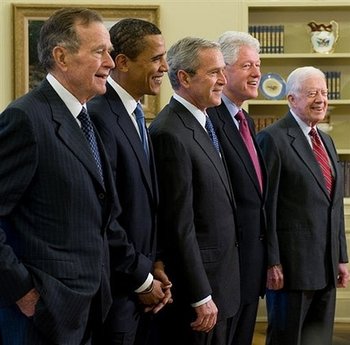
by Bret Capranica | Oct 1, 2013 | Featured Articles, Presidential History, Time/Life Management
Mixing two of my interests (Presidential History and productivity), I was intrigued by this Vanity Fair article on President Obama. I’m quite sure it was part of the 2012 election public relations strategy, but I did find a few interesting approaches from the current President to streamline decision making, keep himself focused, structure meetings, and working with people. Just two short excerpts: Routine and Its Impact on Decision-Making This time he covered a lot more ground and was willing to talk about the mundane details of presidential existence. “You have to exercise,” he said, for instance. “Or at some point you’ll just break down.” You also need to remove from your life the day-to-day problems that absorb most people for meaningful parts of their day. “You’ll see I wear only gray or blue suits,” he said. “I’m trying to pare down decisions. I don’t want to make decisions about what I’m eating or wearing. Because I have too many other decisions to make.” He mentioned research that shows the simple act of making decisions degrades one’s ability to make further decisions. It’s why shopping is so exhausting. “You need to focus your decision-making energy. You need to routinize yourself. You can’t be going through the day distracted by trivia.” The self-discipline he believes is required to do the job well comes at a high price. “You can’t wander around,” he said. “It’s much harder to be surprised. You don’t have those moments of serendipity. You don’t bump into a friend in a restaurant you haven’t seen in years. The loss of anonymity and the loss of surprise is an...

by Bret Capranica | Jul 19, 2011 | Featured Articles, Ordinary Pastor, Pastoral Ministry, Time/Life Management
This week I will spend the better part of a morning reviewing major personal and ministry goals from the past three months and evaluating what I should focus on over the upcoming three months. I make these plans in theological pencil, recognizing that God riules over every detail in both the short and long term ““ I am desperate to avoid presumption (James 13-17). At the same time, I want to be wise and intentional about the life and ministry God has entrusted to me as a stewardship. So what will I do this Thursday morning in evaluation and planning. Pray. This is more than an obligatory beginning step; it is a cry to an almighty God from a desperate heart that is deeply affected by His merciful grace, seeking wisdom and leadership from the one who is all-knowing. I dare not plan without a spirit of dependency, and dependency is deepened when I humble my heart in prayer. Review my long-range goals. I base these on the providential roles I have (husband, father, pastor, etc), as well as key verses that describe God’s desires for me inch of these roles. Some of my roles have been broken down into additional categories (i.e., pastor: teacher, shepherd, staff supervisor, etc.). I often find myself revising these long-term goals, seeking greater clarity insight of providential circumstances, better understanding gained through the study of Scripture, the passing of time and gaining specific experience. My aim is to to be practical in how I apply God’s word in each of the roles God has blessed me. Review my annual goals. Each year I...

by Bret Capranica | May 6, 2011 | Featured Articles, Ordinary Pastor, Pastoral Ministry, Time/Life Management
The previous post looked at the background, reasons, and benefits of having a weekly planning or review in order to focus on priorities in life. In this final post, I want to look at when you should do the review, what I do, and some things to watch out for. When Some of the principles that should govern when you do your weekly review are: “¢ Toward the end of your work week so you can look back on what was effective, how the next week will be affected by the previous week, what needs to be adjusted, and what needs to be followed up. “¢ Close to the beginning of your new work week. More than likely, your brain needs a break from the activity of the week. But before you begin a new one, your mind needs to gain an overall perspective of what”™s ahead. Pick an in-between time ““ where you”™ve had the opportunity to get away from the previous week and when you can mentally set the agenda for the next. For me this is Saturday morning. Friday is my day off and I typically block the day for family activities and rest. I don”™t want to think and plan on that day ““ I want to decompress and enjoy my family. So planning on Friday would simply be exhausting and frustrating. Sunday is filled with ministry opportunities. The morning is focused on preparing to preach and teach, the afternoon generally consists of lunch with church members and preparation for our evening gathering. I also often meet with a group of men to discuss Sunday”™s...

by Bret Capranica | May 3, 2011 | Featured Articles, Ordinary Pastor, Pastoral Ministry, Time/Life Management
One of the most helpful tools in my time management arsenal has been the weekly review or weekly planning. That is, taking a set amount of time with a prescribed list of actions that help me think through what needs to be done according to priority during the next week. Today and Friday, I will describe this process ““ from its background to its purpose, benefits, timing, problems, and details. Background I was first exposed to the idea of a structured time weekly planning after attending a Franklin Covey workshop on time management. As I look back and prior to what I do now, I did try to plan out my week each week. Out of necessity and from too many weeks of being frustrated that I was never accomplishing what was most important, I would generally try to come up with some sort of schedule. However, after going through Covey”™s approach to thinking through my various roles in life and being intentional about how I would act on those important roles in the next week, I began to become much more purposeful in my weekly planning. In the Covey seminar, we were asked to schedule a 20 minute time each week where we would review our personal mission statement, roles in life, and long-term goals. Based on these, I would put on my schedule and task list what I would do in the next week to enhance those roles and move my goals forward. Then came David Allen”™s Getting Things Done. Covey was good for me in thinking long-term. Allen”™s book was a gold mine for me thinking...

by Bret Capranica | Apr 2, 2011 | Featured Articles, Ordinary Pastor, Pastoral Ministry, Presidential History, Time/Life Management
What should an ordinary pastor glean from how the President”™s office was organized and functioned? The pastorate is not a political machine like the White House, so many issues are simply inappropriate and unnecessary. But I can find a number of helpful points to consider when thinking through how a pastor should think about how to make the best use of his time. A pastor can”™t run ministry on his own, but needs key and capable people to rely upon. The biblical principle of eldership indicates that no one man should be directing the affairs of the church. Qualified and capable men who can collectively oversee the church”™s ministry are needed. Ephesians 4:11-16 is a great picture of every part of the body doing its share, with pastors assuming one key role ““ that of equipping others to carry out the ministry. We need some regular (daily, weekly, monthly, quarterly, annual) time to think, write, plan, pray, and rest. Otherwise, a pastor”™s time will be reactive rather than proactive; he will lose focus on what is most important for the whole of the church because he is caught up in putting out immediate fires, and he will mentally and emotionally wear himself out from trying to keep up with every conceivable issue beyond his control. Trust and focus are key commodities in how we work with staff around us. Written plans culled and vetted by key staff as opposed to spur-of-the-moment conversations with innumerable personalities provides a more proactive, and thoughtful approach to advancing ministry objectives. Ministry needs to be thought through. What are the biblical parameters and implications...

by Bret Capranica | Apr 1, 2011 | Featured Articles, Presidential History, Time/Life Management
Richard Nixon”™s approach to running the West Wing reshaped the role of the Chief of Staff to the point that it is still largely used to this day in the Office of the President. Interestingly, Eisenhower had a Chief of Staff, but most decisions were made by Cabinet Secretaries. Kennedy did not have a Chief of Staff and operated in a more free style with no intentional chain of command as to how decisions were made. Nixon changed the approach so that decisions were made in the White House and executed then by Cabinet Secretaries. He divided White House responsibilities into 3 areas: Domestic Council, National Security Council, and the Office of the President. Nixon wanted information mostly in written form and received it only from a few people with whom he would discuss it. They created the position of the Staff Secretariat who distributed the paper work appropriately. Trust was the most important commodity. Nixon was a very private person and preferred to consider succinct written proposals, summaries or analyses, with a few people. Decisions were made in the White House and Cabinet Secretaries executed those decisions. 7:30 a.m. was the start time for most White House senior officials. Nixon was careful with his public activities and focused on what would be the most significant issues. The president spent a tremendous amount of time on fewer things. Haldeman had a lack of ego, a passion for anonymity, but a self-confidence in his own ability. Trust and focus were his emphases. The story of the day, everyday, was “Think it Through!” Everything was thought through to the maximum. Every day at 2:00...













